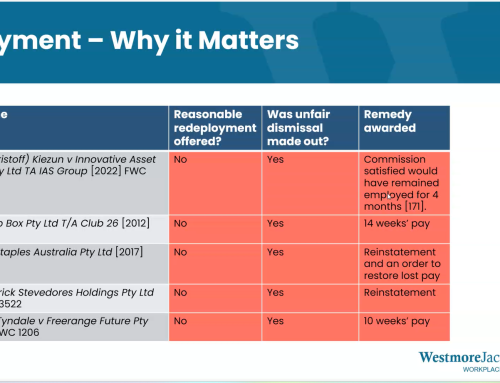
“A restraint clause is not enforceable against an employee whose employment ends by the employer’s wrongful conduct – whether it be wrongful dismissal or…. In a recent Victorian Supreme Court of Appeal (“Court”) decision, an accountancy firm failed in its bid to enforce what would have (probably) been an otherwise enforceable post-employment restraint of trade. This occurred because: In an analysis of past decisions, the Court noted significant authority for the proposition that “a restraint clause is not enforceable against an employee whose employment ends by the employer’s wrongful conduct – whether it be wrongful dismissal or…. [by acceptance of an employer’s] repudiatory conduct”. The Court, in effect, held that if the employment ends in this way, then post-employment restraints are void and unenforceable. The Court also held that a clause in an employee’s contract that stated the post-employment restraints “survive the termination of the Employment in all circumstances and for any reason” did not save the restraint. The Court noted there was clear authority that clauses of this type will not “save a restraint clause where an employer’s repudiatory conduct is accepted by an employee”. The Court, however, carefully noted that this is not a universal ‘rule of law’ “which dictates such a result in every case”. In other words, there may be circumstances where a post-employment restraint is enforceable notwithstanding an employee’s acceptance of their employer’s repudiatory conduct. What is Repudiation? In general terms, repudiation occurs when a party can’t or won’t perform a contract. In more technical terms, repudiation requires a party to show what a reasonable person would consider either an unwillingness or inability to perform their contractual obligations. Repudiation is a high bar, and is not found lightly. The classic example of repudiatory conduct is an employer refusing to pay an employee. Once a party has repudiated a contract, the other party then has a choice. It can either continue in the repudiated contract, or ‘accept’ the repudiation by terminating the contract and ending employment. The accountancy firm above did several things the Court considered repudiatory. First, the business failed to comply with the terms employee’s employment contract regarding the payment of his discretionary bonuses. Specifically, the business did not give due regard to the factors it was contractually obliged to consider when deciding whether to pay the bonus. Second, the business significantly changed the employee’s position without his consent. The business did this by reducing the employee’s autonomy and responsibilities so greatly that he had been effectively required to work a job different to that described in the employment contract. Implications for Employers – This decision has two implications for employers. First, employers should consider the legal strategies available to reduce the likelihood of a post-employment restraints falling victim to a successful repudiation argument. The best place to start here is to chat with an Employment Lawyer. Second, employers will need to pay careful attention to the terms of an employment contract as to avoid accidentally repudiating an employment contract. This is because there is a good chance an employee will, in effect, escape liability for their post-employment restraints if their employment ends because the employee accepted their employer’s repudiation. This may be the case even if the restraint itself is otherwise enforceable, or is expressed in the contract as surviving termination of employment. In our experience, employers do not deliberately set out to repudiate employment contracts. Instead, an employer’s repudiatory conduct occurs inadvertently. Situations commonly giving rise to repudiation include an employer unilaterally changing an employee’s role or an employer failing to properly exercise discretion regarding bonus payments. This article is general information only. If you need legal advice, then please contact us.






Leave A Comment